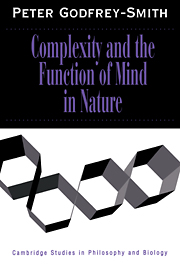3 - Spencer's version
Published online by Cambridge University Press: 05 June 2012
Summary
Spencer's place
Herbert Spencer (1820–1903) occupies an unusual place in history. He was unquestionably one of the most prominent intellectual figures in the English-speaking world during the Victorian period. He was largely self-taught, and not affiliated with any university or research institution. He published on biology, psychology, philosophy, sociology, ethics and political science. Spencer is often associated with the label “social Darwinism,” although this is a questionable term for someone more inclined towards (what are now called) Lamarckian mechanisms for change. He did advocate an extreme laissez-faire position in politics and economics. Spencer was respected, with qualifications, by Darwin and was a close friend of T. H. Huxley. Once when Spencer was in financial straits, J. S. Mill offered to finance some of his writings personally. William James was captured by his views early but later revolted. Spencer was active and influential during the entire second half of the nineteenth century, but soon after the turn of the century his reputation fell like a stone, never to recover.
Spencer is, as far as I know, the first person to use a version of the environmental complexity thesis as the central idea in a theory of the place of mind in nature. This historical claim is made very cautiously. There are difficult questions about the extent to which Spencer's work is continuous with earlier empiricist and associationist thought, and with the work of earlier evolutionists such as Lamarck. Many historians consider Spencer a very unoriginal thinker.
- Type
- Chapter
- Information
- Complexity and the Function of Mind in Nature , pp. 66 - 99Publisher: Cambridge University PressPrint publication year: 1996

